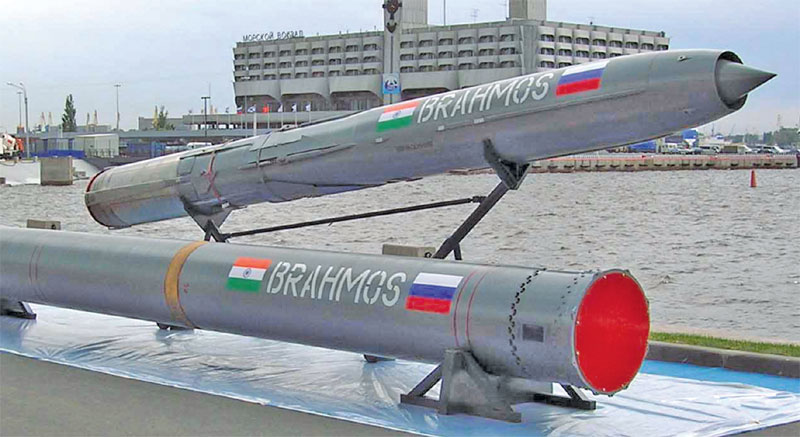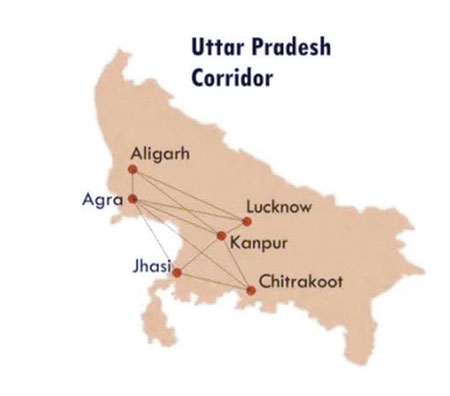The industrial corridors hold promise, but are not yet the answer to defence imports
Mohammad Asif Khan
The government of India announced the establishment of Defence Industrial Corridors (DICs) in 2018 with the primary goal of consolidating and strengthening the nation’s defence manufacturing capabilities.

This initiative aimed at reducing import dependence by stimulating domestic production within the defence sector. Two initial DICs were created, one in Uttar Pradesh (UP) and another in Tamil Nadu (TN). Each corridor encompassed several strategically chosen nodal points that provide a supportive environment for defence industries. These locations were designed to foster the development of a holistic ecosystem, encompassing infrastructure, a skilled workforce and access to advanced technologies.
The DICs aimed to create a nurturing environment to attract and support domestic companies, including private firms, small and medium enterprises (MSMEs) and startups, to actively participate in defence manufacturing. The DICs are expected to generate economic growth within the host states.
Local businesses will benefit from fulfilling the needs of the armed forces, leading to job creation and increased investment. Additionally, a robust domestic supply chain for defence equipment is crucial for the Indian armed forces. The DICs aimed to improve their operational efficiency by ensuring timely availability of critical equipment.
In the years leading up to 2018, India’s defence sector faced a significant challenge—excessive reliance on imports for military equipment. This dependence made the country vulnerable to external factors, impacting price, delivery timelines, and even potentially limiting access to crucial supplies. Furthermore, India’s domestic defence industry lacked the infrastructure, technology and investment required to manufacture a substantial portion of its own military needs. This resulted in a scattered production landscape, hindering collaboration and efficient use of resources.
The UP DIC
The UP DIC spans six locations across Uttar Pradesh, each focusing on specific areas like aerospace and defence manufacturing. The corridor is planned across six nodes, namely—Lucknow, Kanpur, Jhansi, Agra, Aligarh and Chitrakoot, which spreads across the central, eastern, and western regions of Uttar Pradesh and along the Golden Quadrilateral connecting Delhi to Kolkata, supported by networks of expressways.
 The project had an encouraging start with the announcement of investments worth over INR 3,700 crores in defence production at a meeting organised in Aligarh on 11 August 2018. The Uttar Pradesh Expressways Industrial Development Authority (UPEIDA) was made the nodal agency to execute this project in conjunction with various other state agencies.
The project had an encouraging start with the announcement of investments worth over INR 3,700 crores in defence production at a meeting organised in Aligarh on 11 August 2018. The Uttar Pradesh Expressways Industrial Development Authority (UPEIDA) was made the nodal agency to execute this project in conjunction with various other state agencies.
The corridor has garnered over 114 investment proposals totalling INR 24,510.60 crore. These investments have the potential to create over 41,000 jobs within the corridor. A critical environmental clearance was granted by the Indian government in January 2024, signifying a major step forward for the project. The UP DIC has fostered collaboration between domestic entities and major defence companies.
This is backed by the 138 Memoranda of Understanding (MoUs) signed across the corridor’s six locations. Some prominent companies involved include BrahMos Aerospace, Bharat Dynamics Ltd, Tata Technologies and Adani Defence Systems & Technologies.
Early signs of domestic defence production within the corridor are already emerging. Adani Defence & Aerospace has unveiled two expansive facilities within the UP defence corridor in Kanpur, dedicated to producing various calibre ammunition and missiles. These facilities are anticipated to address the needs of the armed forces and police, reducing reliance on defence public sector undertakings for supplies. Similarly, Aerolloy Technologies is producing components for aircraft engines, drones, submarines and other defence applications.
In 2021, Prime Minister Narendra Modi laid the foundation stone for an INR 400 crore Bharat Dynamics Limited (BDL) plant in Jhansi. This facility was focused on producing propulsion systems for anti-tank guided missiles. The Indian government also approved a project to manufacture over 5,00,000 AK-203 assault rifles in a unit located at Korwa, Amethi. These 7.62 millimetre calibre rifles are intended to replace the existing INSAS rifles that have been in service for over three decades.
The TNDIC
Located along the eastern coast of Tamil Nadu, the Tamil Nadu Defence Industrial Corridor (TNDIC) targets innovation in defence. Cities like Chennai, Coimbatore and Salem house both established companies and startups working on defence projects, with a target investment of INR 20,000 crore by 2024-25. Initially, the project faced challenges in attracting investment. However, the TNDIC has secured investments totalling INR 11,794 crore from 53 companies and organizations. This significant inflow of capital is expected to generate job opportunities within the corridor.

The Tamil Nadu government has implemented a supportive strategy to facilitate the TNDIC's development. This strategy includes establishing standard testing and manufacturing facilities, offering incentives to attract industries, supporting private sector research and development, and implementing skill development programs for the workforce. The TNDIC is focusing on the production of a wide range of defence equipment and weapons. This includes defence aircraft, artillery guns, helicopters, combat vehicles, submarines, missiles and rockets, armoured personnel vehicles (APVs), satellites and warships. Some of the major companies involved in the TNDIC include L&T Aerospace and Missile Division, Lakshmi Machine Works, Roots and UTC Aerospace.
The corridor also leverages partnerships with international original equipment manufacturers (OEMs) and tier-1/tier-2 suppliers within the aerospace and defence sector. Notably, Tamil Nadu is already home to over 120 aerospace component manufacturers and more than 700 suppliers in related sectors.
Some of the new facilities include an RF (radio frequency) and Antenna Testing facility in Chennai, a Mechanical Test Center in Trichy, a General Engineering Testing facility at Coimbatore, an unmanned aerial system (UAS) Test centre at Ulundurpet and Integrated Material Management Facilities at Hosur and Coimbatore. A defence park will come up on 400 acres at Sulur near Coimbatore, while more such exclusive facilities will be established at Ulundurpet, Salem and Trichy, besides the 250-acre aerospace park established near Chennai.
You must be logged in to view this content.

